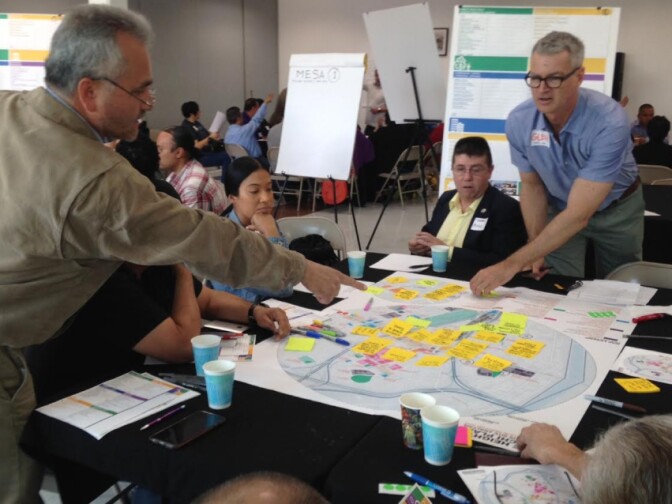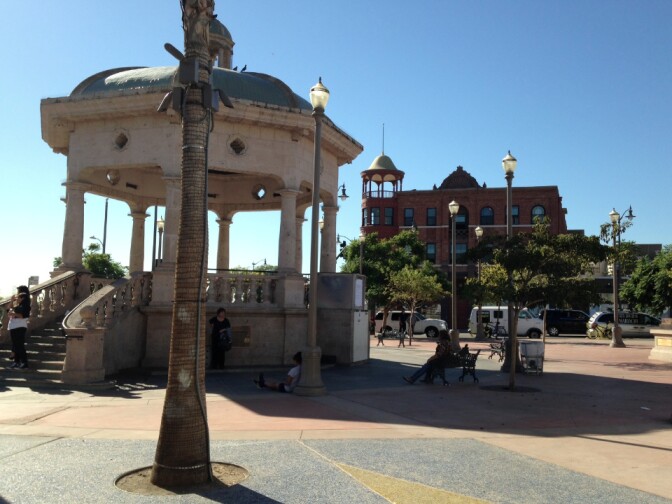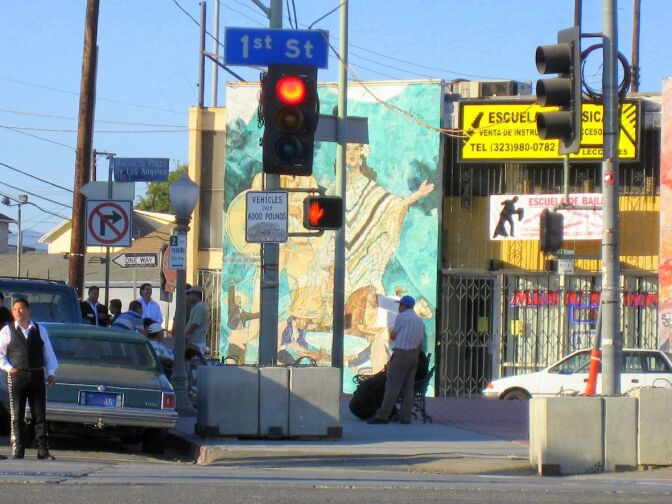This story is free to read because readers choose to support LAist. If you find value in independent local reporting, make a donation to power our newsroom today.
This archival content was originally written for and published on KPCC.org. Keep in mind that links and images may no longer work — and references may be outdated.
As Metro seeks ideas for what to build at Mariachi Plaza, musicians weigh in
One recent afternoon, Santos Monje strummed his guitar and sang an ode to Mariachi Plaza, a song he's dubbed "El Corrido de la Boyle." It's a love letter to the plaza at the corner of First Street and Boyle Avenue, a place he's frequented as a professional mariachi for nearly 30 years.
“I’m happy here, I enjoy myself here," said Monje, an immigrant from Guatemala, in Spanish. "Lots of people come here to see us. I really feel as if it’s my home.”
Mariachi Plaza in Boyle Heights is a local landmark, known for the generations of mariachis who’ve long gathered there to wait for gigs. It's home to a large community of musicians, most of them immigrants from Mexico, or from parts of Latin America where traditional Mexican music is embraced.
More recently, the plaza has also been home to a Metro Gold Line station. Metro owns most of the land around the plaza - and wants to develop a parcel directly adjacent to it.
It's Metro's second attempt. Early last year, a plan to develop 120,000 square feet of retail and medical office space was scrapped after residents objected, saying they wanted more input.
In recent weeks, Metro officials have held two community workshops in Boyle Heights, asking locals to suggest ideas.
“Mariachi Plaza is a very iconic, important, symbolic property in Boyle Heights," said Vivian Rescalvo, a project manager with Metro, at one of the meetings last month. "It’s a place that people identify as their cultural center. We want to preserve that. But we have this opportunity immediately adjacent...like if we had to just pick whatever you wanted to see on this property, what is it that Boyle Heights needs?”
That depends on who's asked. People who came to the workshops Metro recently hosted suggested all kinds of things, among them a grocery store, a laundromat, low-income housing, a senior center and a skate park for local teens. Some people even suggested a mariachi museum.
But the musicians who've been coming here for years have their own ideas.
Violinist Jose Zamora, 73, first arrived at First and Boyle decades ago when the "plaza" was little more there than a wedge of open space in the road.
“Right here in the middle of the plaza, there was a donut shop here," Zamora said in Spanish. "There was a street that went through it."
Across the street there was a gas station. There was a laundromat. And this hotel here that's so pretty, it was in really bad shape," he said, referring to the now-refurbished Boyle Hotel, once a cheap crash pad for musicians. "That was back then.”
Mariachi Plaza today is much bigger, a paved public square with benches and a bandshell, much like a traditional plaza in Mexico. The Gold Line entrance sits in the middle. On one end, closer to the hotel, sit a row of small businesses on a property that Metro once planned to buy and demolish; Metro officials say that idea's no longer on the table.
Still, the mariachis are worried about what might happen - and they have several ideas of their own. Among those at the first Metro meeting last month was guitarist Arturo Ramirez, a leader and organizer among the mariachis who’s been coming to the plaza since the 1980s.
“I suggested, first of all, that there be no displacement…that if something is built, that the mariachis can stay there," Ramirez said.
Ramirez spoke for the other musicians, who were busy lining up gigs that Saturday. He had a few other suggestions to throw out.
"We need parking, not only for the mariachis, but for the business, and the people who come and hire the mariachis," he said.
Not only that, he said, but how about some shade? Ramirez said it's something the mariachis have hoped to raise money for, but it hasn't happened yet: "We'd like to have umbrellas, with seats and shade, not so much for the mariachis, but for our clients, who come to hire us, so they can sit down and have a soda or an ice cream," he said.
Other musicians at the plaza had similarly practical ideas: A public restroom, so that people don't need to duck into the nearest business. They also want more restaurant options.
Jose Zamora, the veteran mariachi, said he enjoys the tortas - Mexican sandwiches - that the one eatery on the plaza serves.
"They're very good...but you can’t always eat the same thing," he said.
There is one thing all the musicians agree on: They’re genuinely worried about gentrification, which has already appeared on First Street.
The last of the old bars where the mariachis played for patrons recently closed down. A new taqueria down the street sells non-traditional items, like kale lemonade. Times are changing.
The musicians fear that if more development causes the area to change completely, the soul of Mariachi Plaza - and the traditions that live there - could be lost.
But perhaps not. There are signs of the next generation emerging. One recent afternoon, on the ground floor of the Hotel Boyle, 13-year-old Yureli Mendoza studied mariachi violin with Jose Zamora. The veteran mariachi is also a classically trained instructor, well-known in musician circles. He teaches several young students, including Yureli, who herself wants to be a mariachi.
She and her father drive to Mariachi Plaza from Huntington Park for the lessons. It's here that they knew to look for Zamora.
“I was looking for a teacher, and everybody kept telling me that this teacher was here," she said. "We looked for him, and nobody could tell us where he was. Then we came here - since this is the Plaza de Mariachis - and we found him.”











